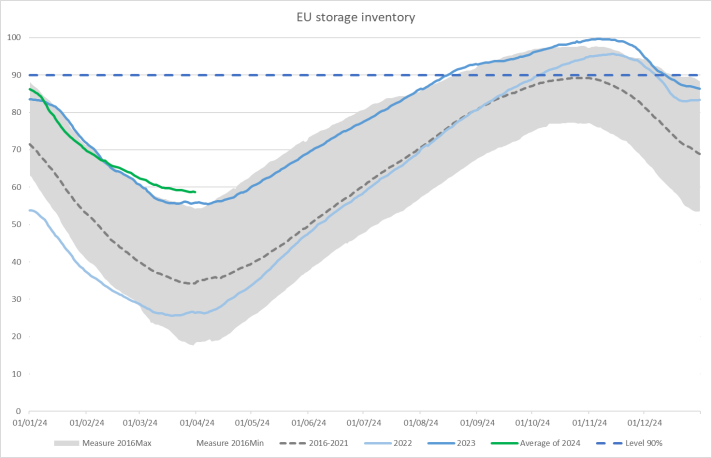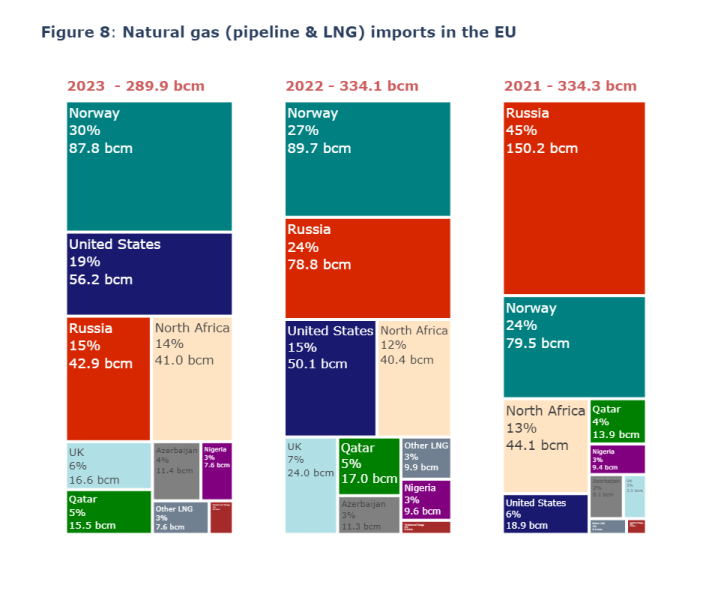Europe is emerging from its second winter since Russia's illegal invasion of Ukraine. Despite many fears, we have emerged stronger than before, with greater energy security and solidarity, and a cleaner energy mix.
On 31 March, when the winter heating season ended, our gas storages were over 58% full. This is the highest level on record at this time of year.
These high storage levels are a result of our successful diversification of energy supplies, the efforts of citizens and businesses to reduce gas demand, and our investments in renewable energy – the three pillars of our REPowerEU Plan.
The high level of gas storage in Europe means that markets are increasingly stable, prices are back around pre-war levels, and Europe can start refilling with confidence for next winter's heating season.
While we can be proud of how the EU has managed the energy crisis so far, there is no room for complacency. We must continue to support our citizens and industry, and our Ukrainian friends. Ensuring Europe's energy security and competitiveness, bringing down prices and advancing the clean energy transition remain a high priority.
Background
In response to Russia's invasion of Ukraine, the European Commission proposed the REPowerEU Plan in March 2022, to end Europe's dependency on Russian fossil fuels. EU Leaders unanimously agreed on the need for a detailed plan, and this was subsequently presented by the Commission in May 2022. Several emergency legislative measures in the energy field followed during the course of 2022, and these have been implemented together with our Member States, citizens and industry, and reliable international partners.
The share of Europe's Russian gas imports fell from 45% in 2021 to 24% in 2022, and further to 15% in 2023. This downward trend must continue.
Europeans have reduced their gas demand by almost 20%, which has allowed us to save more than 107 bcm of gas in the last 18-months.
The increased share of renewables in the energy mix has allowed us to replace the equivalent of 24 bcm of Russian gas in 2022 and 2023. And emissions from the power sector fell by an impressive 24% in 2023, while our economy also continued to grow.
More information on REPowerEU is available here.
Among the measures proposed by the Commission was a target for Member States to fill gas storages to 90% capacity by 1 November every year. With EU gas storages more than 58% full on 1st of April, we now enter the injection season with the highest storage level on record (see below Figure). European operators have also stored 2 billion cubic metres (bcm) of gas in Ukrainian storage, providing extra security for Europe, and supporting our partners. This high level of gas storage puts the EU well on track to meet the 90% target on 1st of November 2024, and to enter winter 2024/2025 well prepared. This will also ease the pressure on gas prices during the storage filling season.
Figure: EU gas storage inventory
Source: Commission (DG ENER and JRC) based on GIE AGSI data
The EU's gas supplies have undergone a rapid realignment since Russia's illegal invasion of Ukraine, as seen here in the data for 2021-2023 imports:
The share of renewable energy has continued to increase during the crisis, in line with REPowerEU objectives. New installed renewables capacity in 2022 and 2023 replaced the equivalent of 24 bcm of Russian gas with European renewable electricity. Thanks to this increase in the share of renewables capacity and the recovery of nuclear and hydro generation, the EU's CO2 emissions linked to the power sector are down by 24% in 2023 compared to 2022.
On the demand side, in line with the coordinated gas demand reduction agreed by Council in August 2022, the EU reduced demand by 18% between August 2022 and January 2024 compared to the average between April 2017 and March 2022. This corresponds to savings of more than 65 bcm of gas in 2023 alone (and 107 bcm in total over the 18-month period). On 25 March 2024, the Council formally adopted a recommendation to Member States to continue reducing their gas consumption by at least 15% until 31 March 2025. This should be done in a way that protects EU industry so that it can benefit from lower gas and power prices to strengthen European competitiveness.
After peaking at over 300 EUR/MWh at the height of Russia's weaponisation of energy supplies in August 2022, gas prices are down to pre-war levels and have been consistently below 30 EUR/MWh since January 2024.
Details
- Publication date
- 12 April 2024
- Author
- Representation in Luxembourg


